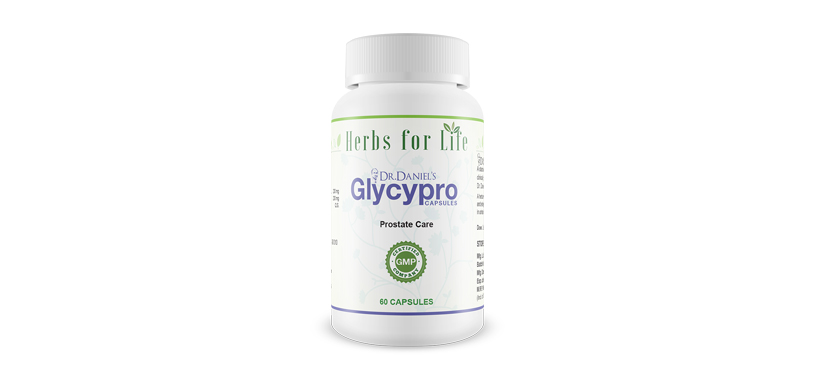Dr.Daniel’s Glycypro for prostate enlargement and cancer.
Dr.Daniel’s Glycypro is a well researched product containing highly medicinal herbal remedies for prostate problems such as seeds of pumpkin (Cucurbita pepo) and liquorice (Glycyrrhiza glabra Linn) extracted and formulated scientifically .
Prostate Prolems (enlargement and cancer). The prostate gland is a walnut-shaped gland that wraps around the urethra like a collar. It is part of a male reproductive system in man. One of its main functions is to add fluid to sperm. Although the gland starts out small, it grows as men age and this process is called benign prostatic hyperplasia (BPH). It is because during aging the male sex hormone testosterone get converted to a related compound, dihydrotestosterone which stimulates prostate cell proliferation. Eventually, an enlarged prostate can clamp down on the urethra, restricting the flow of urine from the bladder and semen. This leads to problems such as frequent urination, urine leakage, urinary tract infections and pain at the time of ejaculation.
The symptoms of prostate problems are the following
- A frequent and urgent need to urinate. One may have to get up several times a night to go to the bathroom.
- Trouble starting a urine stream.
- A weak stream of urine or a small amount of urine passing every time.
- The feeling of unfinished urination.
- Leaking or dribbling urine.
- Small amounts of blood in your urine
- Problems with sexual function and performance, such as difficulty achieving erection or painful ejaculation
There are only 2 drugs, finasteride (Proscar) and terazoin (Hytrin) to treat prostate enlargement in allopathic system of medicine. Proscar is not effective for about 50% of men and also causes side effects like decreased libido, ejaculatory problems and loss of erection. Surgery is often resorted to reduce the size of prostate. But in folklore there are excellent medicines like pumpkin seeds. Dr James Duke, the well known American Ethnobotanist and Phytochemist, recommends liquorice and saw palmetto also for treating this disorder (Green Pharmacy).
Cancer in Prostate gland is common in men after 60. Symptoms are similar to those of prostate enlargement. Prostate cancer is associated with urinary dysfunction as the prostate gland surrounds the prostatic urethra. Changes within the gland, therefore, directly affect urinary function. Because the vas deferens deposits seminal fluid into the prostatic urethra, and secretions from the prostate gland itself are included in semen content, prostate cancer may also cause problems with sexual function and performance, such as difficulty achieving erection or painful ejaculation. Advanced prostate cancer can spread to other parts of the body, possibly causing additional symptoms. The most common symptom is bone pain, often in the vertebrae (bones of the spine), pelvis, or ribs. Spread of cancer into other bones such as the femur is usually to the proximal part of the bone. Prostate cancer in the spine is of low-risk and careful observation of the tumor over time is needed. It can also compress the spinal cord, causing leg weakness and urinary and fecal incontinence. The monitoring process may involve serial PSA, physical examination of the prostate, and/or repeated biopsies. The goal of surveillance is to avoid overtreatment and the sometimes serious, permanent side effects of treatment for a slow-growing or self-limited tumor that would never cause any problems for the person. For 50% to 75% of people with prostate cancer it will cause no harm before a person dies.
Aggressive prostate cancers are treated by surgery, radiation therapy and external beam radiation therapy, high-intensity focused ultrasound (HIFU), chemotherapy, oral chemotherapeutic drugs (Temozolomide/TMZ), cryosurgery or hormonal therapy.

